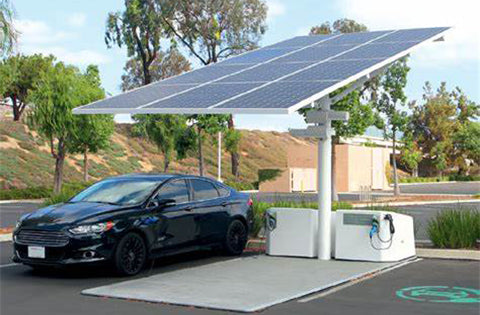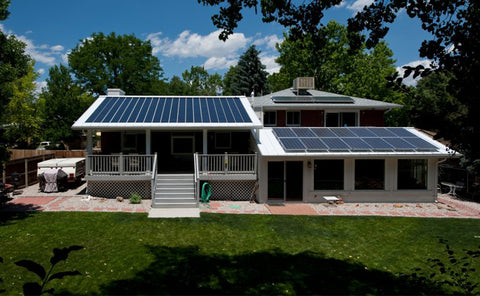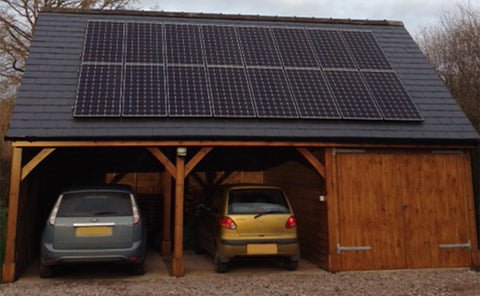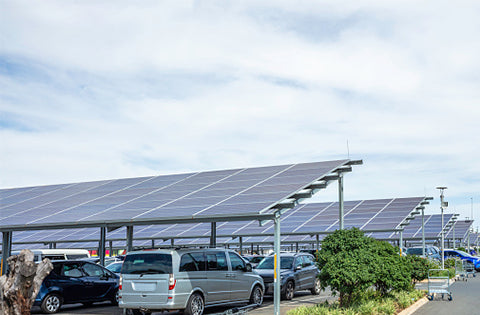With the global warming fasten its steps, a globally energy crisis continues to prevail all parts of the world. The electric vehicle (EV) has become a hot product in recent years. Rather than tradition vehicles depend on fossil fuel, EV is started by electricity that will not produce any pollution. But the questions is: What can supply constant electricity for EV? The answer is: solar. And Whether you already have a home solar system or you are planning on getting solar panels installed, there is no doubt that this climate-friendly energy choice gives you the freedom to be less dependent on traditional fossil fuel.
Moreover, if you own an electric or hybrid vehicle, you can optimize your home solar system to charge your electric car. Here are some important things about using your home solar panels as a car-charging source.
Necessary components for your EV charging
Understanding the basic things you need to optimize your home’s solar system to charge your electric vehicle (EV) is essential:
- Sufficient Number of Solar Panels: The number of panels depends on your car’s battery. Generally, about 10 panels are needed to charge an average-sized car battery.
- Solar Batteries: Excess electricity generated from solar panels is typically returned to the power grid. Solar panels do not store electricity that is not immediately used, so a solar battery is needed to save the excess power for you to use to charge your electric car overnight. Without a battery, you can only charge your vehicle during the day while your solar panels are actively generating power.
- Home Charging Unit with a PV Inverter: This system is required to convert the direct current output of photovoltaic energy into alternating current) necessary to power your appliances and charge your car. Without a proper solar inverter, you will not be able to charge your EV.
Note that if you do not have solar batteries, you can still use your home solar system to feed excess electricity back into your power grid. In this sense, you are offsetting your use of grid electricity to charge your car with the solar energy you provided to your power company.
The benefits of using home solar system to charge your EV
1: Lower charging cost
If you use your rooftop solar system or solar-battery solar system, the cost to charge your EV is cheaper than the costs of using public charging stations and home grid power. The average charging station cost is $0.30 to $0.60 per kWh, and the average grid power cost is $0.10 to $0.40 per kWh. If you use your home solar power to charge your electric car, it costs, on average, less than $0.11 per kWh. You would only pay around $415 on average each year to charge your EV with your home solar system.
On the other hand, you would pay more than $600 on home grid power and more than $1,000 at charging stations. If you owned a fuel-powered car, you would pay at least $1,200 each year, and inflated fuel prices could drastically increase this annual cost.
2: Less dependence on power grids
Whether or not your home solar is connected to the power grid, you are not wholly dependent on your utility company for power. If there are scheduled power outages or your electric company has issues, your home still has power. When you have solar batteries, you also can use your solar energy to power your home and charge your electric car throughout the night. You can even help power your neighbor’s home during a blackout.
3: Free of carbon emissions
If you have both a home solar system and an electric car, you have peace of mind knowing that you are emission-free. This powerful zero-energy combination allows you to be a positive force for improving our natural environment.
4: No stress over fluctuating fuel costs
When you use your home solar system to charge your EV, you do not have to worry about rising gas prices to fuel your car. You have your own gas station and can gain confidence in being self-reliant.
5: Substantial lifetime savings
Depending on certain factors such as the type of electric vehicle you drive, the size of your solar system, and your household energy use, your estimated lifetime savings of using your home solar to charge your EV is about $15,000 to $26,000.
The best uses for your home solar panel system
At SOLARPARTS, we carry both off-grid and grid-tied solar panel kits for your home to use to charge your electric car. When you install one of our solar kits, you’re assured a premium system that works, but you receive access to lifetime support. Contact us today and get one step closer to becoming a zero-energy homeowner!
Twitter: Solarparts Instagram: Solarparts
Tumblr: Solarparts Pinterest: Solarparts
Facebook: Shenzhen Solarparts Inc
Email address: Philip@isolarparts.com
Homepage: www.isolarparts.com





